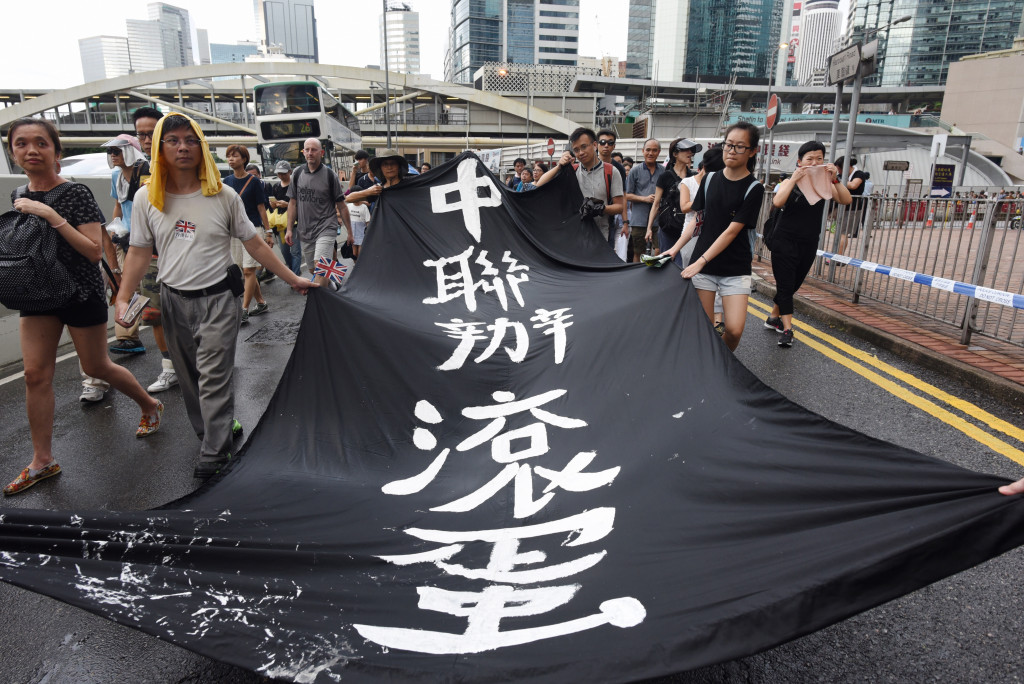By Wilson Leung
July 1 – the day which marks Hong Kong’s handover to China. July 1 – the day known for its celebratory fireworks display, but more importantly, for its symbolic annual march.
In the two decades since the establishment of the Special Administrative Region, the march has become synonymous with political discontent, serving as a platform for the public and pro-democracy activists to lobby for genuine democracy and universal suffrage. In 2003, 500,000 demonstrators joined the march, forcing the government into an embarrassing climb-down on its proposed national security law.
Unsurprisingly, the July 1 march has been a target of vicious attacks. This year, the pro-Beijing newspaper Ta Kung Pao criticised the march, suggesting that it “violates” the law and the constitution and thus should be “banned”. The one-sided editorial attempted to support this claim by alleging that the march encourages citizens’ disobedience and disrupts business activity.

However, these claims are quite simply unfounded.
The July 1 march does not violate the law or constitution. Hong Kong is governed by the Basic Law, the city’s de facto constitution. Article 27 of the Basic Law explicitly guarantees that “Hong Kong residents shall have freedom of speech…freedom of association, of assembly, of procession and of demonstration”.
These freedoms are further entrenched by the Hong Kong Bill of Rights and the International Covenant on Civil and Political Rights, which are binding legal instruments.
The Hong Kong courts have affirmed, time and time again, that the freedom to demonstrate is a constitutional right that must be protected.
As the Court of Final Appeal made clear in HKSAR v Leung Kwok Hung, “The freedom of peaceful assembly is a fundamental right. It is closely associated with the fundamental right of the freedom of speech. The freedom of speech and the freedom of peaceful assembly are precious and lie at the foundation of a democratic society. These freedoms are of cardinal importance for the stability and progress of society”.
Ta Kung Pao’s accusation that the march encourages citizens’ disobedience and disrupts business activity is also wholly inaccurate. Rather than encouraging disobedience, this march has been consistently hailed for its calm, peaceful, and family-friendly atmosphere. It is common to see parents marching with their children, hoping to pass on their ideals and democratic dreams to the next generation.

So why is Ta Kung Pao launching such criticisms? Two motives can be discerned.
First, it is an attempt to distort the Hong Kong public’s understanding of the fundamental rights protected by the Basic Law. These rights are still enjoyed in Hong Kong to a far larger extent than on the Mainland, where events such as the “709 crackdown” on human rights lawyers, the incarceration (and eventual death) of Liu Xiaobo, and the imprisonment of journalist Gao Yu – to name but a few – all evidence the PRC government’s contempt for human rights.
In Hong Kong, the government derives legitimacy by being accountable to the people and accountable to the law. This is how we uphold the rule of law. In the PRC, however, executive action appears in the guise of the rule of law.
Disregarding what the PRC constitution actually says (for instance, Article 35, which guarantees freedoms of speech and assembly), the PRC government uses the rule of law to justify its acts and to wrap them in a cloak of legitimacy.

Ta Kung Pao’s editorial is part of Beijing’s creeping efforts to make the Hong Kong public believe that freedom of assembly, and other civil liberties, are not inherent rights that protect people against government – they are privileges granted by the government to its supporters.
Second, it is an attempt to discourage people from getting involved in the march, so as to create a (false) perception of majoritarian pro-establishment support in Hong Kong. The aim – which is a transparent one – is to emphasise the power of the establishment, and to paint a picture of pro-democracy supporters as a small band of troublemakers.
In spite of scurrilous reports like these, one thing remains certain. Freedom of assembly and expression, which encourage dialogue and debate, are crucial features of any democratic society. This is why we, as a community, should stand strong and fulfill our civic duties in the name of democracy by attending the July 1 march.
Wilson Leung is a barrister and a member of the Progressive Lawyers Group.
